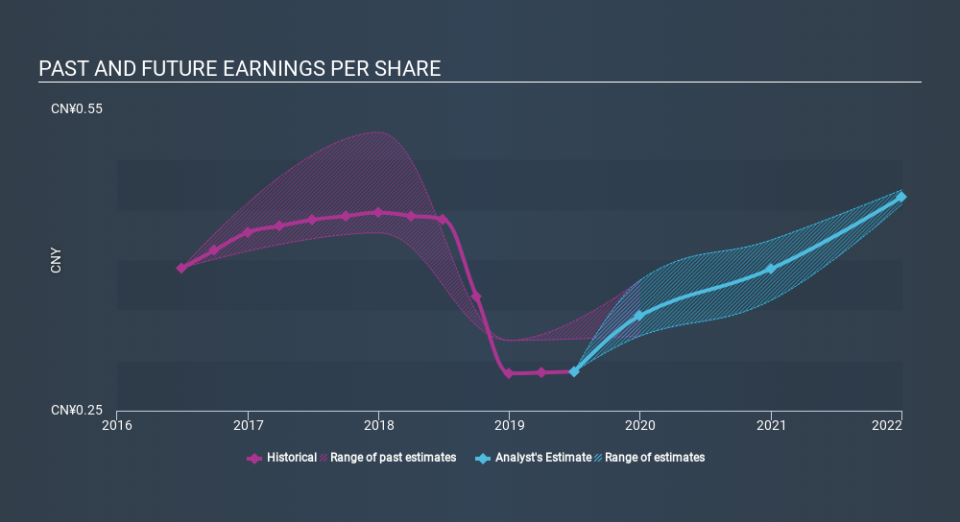Investors Who Bought China Cinda Asset Management (HKG:1359) Shares Five Years Ago Are Now Down 55%

For many, the main point of investing is to generate higher returns than the overall market. But the main game is to find enough winners to more than offset the losers At this point some shareholders may be questioning their investment in China Cinda Asset Management Co., Ltd. (HKG:1359), since the last five years saw the share price fall 55%. More recently, the share price has dropped a further 11% in a month. But this could be related to poor market conditions -- stocks are down 8.5% in the same time.
Check out our latest analysis for China Cinda Asset Management
While markets are a powerful pricing mechanism, share prices reflect investor sentiment, not just underlying business performance. By comparing earnings per share (EPS) and share price changes over time, we can get a feel for how investor attitudes to a company have morphed over time.
Looking back five years, both China Cinda Asset Management's share price and EPS declined; the latter at a rate of 1.2% per year. This reduction in EPS is less than the 15% annual reduction in the share price. This implies that the market is more cautious about the business these days. The low P/E ratio of 5.10 further reflects this reticence.
The company's earnings per share (over time) is depicted in the image below (click to see the exact numbers).
This free interactive report on China Cinda Asset Management's earnings, revenue and cash flow is a great place to start, if you want to investigate the stock further.
What About Dividends?
As well as measuring the share price return, investors should also consider the total shareholder return (TSR). The TSR incorporates the value of any spin-offs or discounted capital raisings, along with any dividends, based on the assumption that the dividends are reinvested. It's fair to say that the TSR gives a more complete picture for stocks that pay a dividend. As it happens, China Cinda Asset Management's TSR for the last 5 years was -42%, which exceeds the share price return mentioned earlier. The dividends paid by the company have thusly boosted the total shareholder return.
A Different Perspective
While the broader market lost about 5.5% in the twelve months, China Cinda Asset Management shareholders did even worse, losing 16% (even including dividends) . However, it could simply be that the share price has been impacted by broader market jitters. It might be worth keeping an eye on the fundamentals, in case there's a good opportunity. Regrettably, last year's performance caps off a bad run, with the shareholders facing a total loss of 10% per year over five years. Generally speaking long term share price weakness can be a bad sign, though contrarian investors might want to research the stock in hope of a turnaround. While it is well worth considering the different impacts that market conditions can have on the share price, there are other factors that are even more important. For example, we've discovered 1 warning sign for China Cinda Asset Management that you should be aware of before investing here.
If you are like me, then you will not want to miss this free list of growing companies that insiders are buying.
Please note, the market returns quoted in this article reflect the market weighted average returns of stocks that currently trade on HK exchanges.
If you spot an error that warrants correction, please contact the editor at editorial-team@simplywallst.com. This article by Simply Wall St is general in nature. It does not constitute a recommendation to buy or sell any stock, and does not take account of your objectives, or your financial situation. Simply Wall St has no position in the stocks mentioned.
We aim to bring you long-term focused research analysis driven by fundamental data. Note that our analysis may not factor in the latest price-sensitive company announcements or qualitative material. Thank you for reading.

